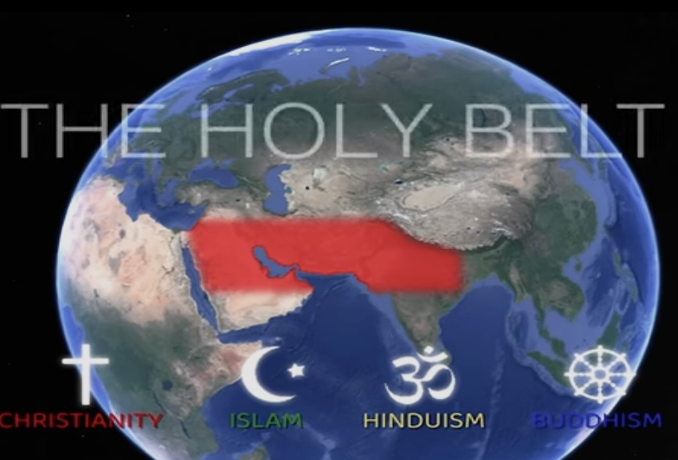
THE world’s major religions—Hinduism, Buddhism, Judaism, Christianity, and Islam—stand today as distinct traditions with unique scriptures, practices, and followings.
Surprisingly, their origins are concentrated within a relatively small geographic region, stretching from the Indian subcontinent to the Middle East. From the banks of the Ganges to the deserts of Arabia, this corridor of land gave rise to humanity’s most enduring spiritual paths which guide the lives of the vast majority of people on the planet today. Their shared locality, overlapping stories, and recurring themes suggest that while each tradition has its own identity, they reflect a common heritage.
Distinctive origins
Hinduism was not established by a single historical mortal. It grew organically over millennia, evolving from Vedic practices, indigenous beliefs, and philosophical reflection. By contrast, Buddhism, Judaism, Christianity, and Islam each trace their origins to a specific figure, respectively, the Buddha, Abraham, Jesus, and Muhammad. These venerable founders gave shape to their communities through revelation, teaching, and reform.
Despite this distinction, all five traditions share the conviction that life is not random but guided by a higher order, with access to spiritual guidance.
Similar scripts
Among the most striking parallels are the birth parables of the three principal patriarchs. Krishna, in Hindu tradition, was born under threat from a hostile king. He was carried in a basket to safety across the river Yamuna. Moses in the Old Testament, was subject to Pharaoh’s decree to kill Hebrew infants. As a baby he was placed in a basket and set afloat, on the Nile to be rescued and preserved. Similarly, the Gospels describe Jesus’ family fleeing to Egypt to escape King Herod’s massacre of children. Across cultures, the motif of the divinely protected child who later redeems his people recurs with profound consistency.
The Great Flood
Narratives of a great flood also appear widely. First, it shows up in Hinduism where Manu and his kin, in a boat, are saved from boundless floodwaters. Then there is the account of Noah and the ark, and again, the retelling of the story in the Qur’an. These accounts reflect a shared memory of an expansive deluge.
Heaven and Hell
Another deep similarity lies in the original stories of the history of humanity. Hinduism speaks of a recurring cosmic cycle of four ages. From an idyllic beginning called the Age of Truth (Satyug), mankind declines over the centuries to the Age of Ignorance (Kaliyug). Buddhism in the Aggañña Sutta, describes luminous beings who descend into material existence, gradually becoming human (imperfect) through craving and attachment.
In Judaism and Christianity, time begins with Adam and Eve living in the Garden of Eden, innocent and happy. With the passage of time, they give in to temptation and the heavenly lifestyle is lost. The dip in moral character that started continues, but there is the promise of a second coming.
Islam preserves a similar account: Adam is formed from clay, infused with God’s spirit, and tempted along with Eve. After the passage of time however, believers who submit and live a righteous life may once again see heaven.
Though expressed differently, these stories are hinged on key themes. Humanity’s beginning is not an accident of nature but of sacred origin, all virtuous and happy, where even the name of sorrow does not exist. When the moral foundation of this pure world is shaken through temptation, craving and attachment, a course of continuous decline is set for all future generations. There is separation from an original perfection—whether in Eden, in Buddhism’s descent into craving, or in Hindu cosmic cycles of sin and salvation. Yet in all cases remains the promise of restoration, through repentance and divine grace.
Human soul
Across these traditions, our destiny is seen as reaching outside earthly existence. There is a human soul, and it must journey beyond, reaffirming that human life has meaning and consequence transcending our current physical existence.
Moral code
Each religion emphasises moral order as the foundation of human creation. Hinduism speaks of dharma, Buddhism of the Eightfold Path, Judaism of the Torah, Christianity of Jesus’ command to love God and neighbour, and Islam of shari‘a, the comprehensive guidance of God. Outward practises differ, but all insist that the blossoming of the human race depends on alignment with sacred principles.
Personal responsibility
The inner journey is equally central. Hindu meditation, Buddhist mindfulness, Jewish and Christian contemplation, and Islamic prayer all stress that transformation begins within. Ritual and law are never sufficient without purification of the heart.
Shared heritage
How do we account for these parallels? Some researchers believe that they may stem from significant cultural exchange and migration of ideas along ancient trade routes from east to west. Seals and other artefacts uncovered indicate that there were exchange settlements between the peoples of ancient Sumer and India. One may also see them as evidence of a shared divine heritage. Different people interpret their experience of the Divine in varying voices, offering guidance suited to their individual culture and local realities.
Conclusion
The religions born within this small geographic belt—Hinduism, Buddhism, Judaism, Christianity, and Islam—may seem to stand apart, but their stories and teachings reveal deep connections. Each contributes unique insights, yet together they affirm that humanity has never been without guidance, that moral order underlies creation, and that the divine continually reaches out to renew the human spirit.
When we recognise these common narratives, from the earliest human stories to the present day, we see the religions not as rivals but as companions shouldering the shared responsibility of returning mankind to its divine origins.
Vijai Sadal is a student of the Brahma Kumaris Raja Yoga Meditation Centre. He can be reached at vijai@pepesmkt.com
![]()














